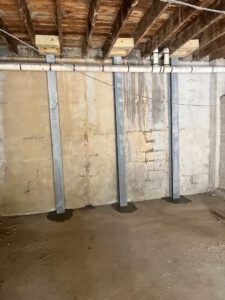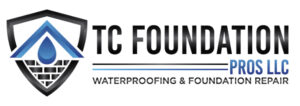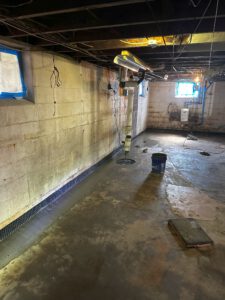
The Importance of Basement Waterproofing
Why should you bother with basement waterproofing? Well, water infiltration not only damages your property but can also lead to mold growth, which is harmful to your health. A damp basement can be a turn-off for potential home buyers if you ever decide to sell.
Identifying the Problem: Signs You Need Waterproofing
Not every basement requires waterproofing. Sometimes, a dehumidifier will suffice. Here are some tell-tale signs your basement needs waterproofing:
Water stains: These often appear on walls and floors.
Mold or mildew: A musty smell is a clear indication of their presence.
Efflorescence: White, chalky substances on your walls or floor.
Different Methods of Waterproofing
There are several ways to waterproof a basement, each suited to different situations. Here’s a breakdown:
Interior Waterproofing
The most basic form of waterproofing involves applying sealants to the interior of your basement walls and floors to prevent moisture from seeping in.
Exterior Waterproofing
A more extensive option, exterior waterproofing involves excavating around your house to install a waterproof barrier. This method is expensive but highly effective.
Drainage Systems
These systems channel water away from your foundation, preventing it from seeping into your basement. They can be installed both internally and externally.
Sump Pumps
These are used to pump out water that has accumulated in your basement. They’re especially useful in areas prone to flooding.
Real-Life Experiences: Basement Waterproofing Solutions That Work
Let’s look at some real-life experiences to get a better understanding of these methods:
John, a homeowner from Seattle, was battling constant dampness in his basement. After trying various sealants, he finally opted for an interior drainage system. The result? A dry, usable basement.
Sarah, living in a flood-prone area in Florida, had a sump pump installed in her basement. Despite heavy rains, her basement remains dry and mold-free.
Digging Deeper: The Science Behind Basement Waterproofing
Understanding the science behind basement waterproofing Uniontown PA can help you make informed decisions. Water seepage in basements primarily occurs due to hydrostatic pressure, which is the force exerted by water in the soil surrounding your home’s foundation. This pressure increases when it rains, causing water to find its way through tiny cracks or porous concrete.
Hydrostatic Pressure and Its Role in Basement Leaks
Hydrostatic pressure can lead to significant structural damage if not addressed promptly. This pressure forces water through the smallest of openings, leading to leaks. These leaks can enlarge, causing more substantial water intrusion.
Capillary Action and Wicking
Another scientific principle at play here is capillary action, also known as wicking. This process allows water to travel through porous materials—like concrete—against gravity. If your basement walls are made of concrete, capillary action might be one of the reasons for dampness.
 Waterproofing Materials: What Are They Made Of?
Waterproofing Materials: What Are They Made Of?
Waterproofing products range from simple sealants to complex drainage systems. Here’s a closer look at their composition:
Sealants: These are typically made of silicone or polyurethane. They form a water-resistant layer on the surface, preventing moisture from penetrating the material underneath.
Waterproofing Membranes: These are sheets of rubber or plastic that are applied to the exterior of a basement to stop water from entering. They’re often used in conjunction with a drainage system.
Sump Pumps: These devices consist of a motor that powers a pump, which removes water collected in a sump basin.
Choosing the Right Waterproofing Solution
The right waterproofing method for your basement depends on several factors, including the severity of the problem, the construction of your home, your budget, and local weather conditions. While interior sealants might be sufficient for mild dampness, severe water intrusion may require more extensive solutions like exterior waterproofing or a sump pump.
Basement waterproofing is a complex topic, but understanding the science behind it and the materials used can help you make the best decision for your home. Remember, it’s not just about picking a solution—it’s about picking the right one. And sometimes, that means consulting with professionals who can accurately assess your situation and propose effective solutions.
Let’s keep our basements dry and our homes healthy! If you have more questions or if there’s anything you’d like to share, please leave a comment below. Let’s learn together!
FAQs
How much does it cost to waterproof a basement?
The cost varies depending on the method used and the size of your basement. On average, it can range from $500 for simple sealants to over $10,000 for exterior waterproofing.
Can I waterproof my basement myself?
While you can apply interior sealants yourself, more extensive methods like exterior waterproofing or installing a drainage system should be left to professionals.
How long does basement waterproofing last?
Depending on the quality of work and materials used, waterproofing can last anywhere from a few years to a lifetime.

 Waterproofing Materials: What Are They Made Of?
Waterproofing Materials: What Are They Made Of?